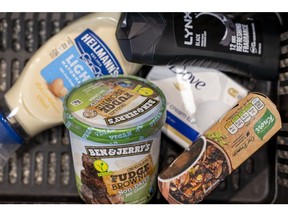Article content
(Bloomberg) — Unilever Plc is announcing more ambitious emissions-cutting goals, targeting suppliers and even the shops that stock its brands, despite concerns from investors that non-financial objectives have become a distraction for the company.
In its latest climate plan released on Wednesday, the maker of Ben & Jerry’s ice cream and Lynx deodorant said it’s aiming to cut greenhouse gas emissions associated with the retailing and consumption of its goods by the end of the decade.
Article content
For example, Unilever wants emissions from indirect sources, including ice cream refrigerators in shops and the recycling of the products it sells, to decline 42% from 2021 levels. It also seeks emissions from forest, land and agriculture — which includes growing commodities such as palm oil — to drop by 30% in the same period.
The new approach comes at a challenging time for Unilever. The company has been riddled by financial underperformance and falling market share, which some investors have blamed on its fixation on sustainability.
At the same time, Republican-led backlash in the US against environmental, social and governance investing threatens to make companies more timid in setting their climate priorities. Executives are under increasing pressure to reassure investors that environmental programs won’t be detrimental to the bottom line.
Thomas Lingard, Unilever’s global head of sustainability, said in an interview that the company’s climate plans were built into its financial-growth model.
“We have to work really hard to make sure that what we’re doing on sustainability is also in support of the overall business growth strategy and consistent with that,” he said. “Now some of this stuff saves money, some of this stuff requires some investment, but net-net it’s consistent with the overall financial objectives.”
Article content
Customers want greener products, Lingard said, and climate impacts have started to hurt the company’s supply chain. Chocolate prices, for example, have doubled this year because of the increased frequency of droughts and floods.
Chief Executive Officer Hein Schumacher, who took on the role last year, has emphasized operational performance and is streamlining the company’s ESG goals around four pillars: climate, nature, plastics and livelihoods. Schumacher also has said that not all of Unilever’s brands need a “purpose.”
Over the years, Unilever has successfully tackled its direct emissions — categorized as Scope 1 and 2 — by switching their sites to renewable energy, for example. But most of its emissions come from the value chain — called Scope 3 — which has proved a much greater challenge.
Unilever had previously announced Scope 3 targets measured by emissions per customer. Today is the first time it’s announced an absolute goal for this category of emissions.
The company’s sustainability initiatives have earned it a high ranking among peers such as Nestle SA and Procter & Gamble Co. on climate action, according to Planet Tracker.
Article content
Notably, Unilever has said since 2021 that it wouldn’t use carbon offsets to meet its near-term reduction targets. It also has promised to go net zero across its value chain by 2039, which is sooner than many national targets that are set for 2050.
However, these carbon reduction commitments have been criticized for being too nebulous and hard to measure.
Lingard said the company has been refining how it measures its progress to improve accuracy — and sees investors being behind the overall sustainability blueprint.
“Investors are very clear that they support what we’re doing, but they also want us to be commercially successful and profitable and grow,” he said. “That’s not really a surprise.”
Share this article in your social network

